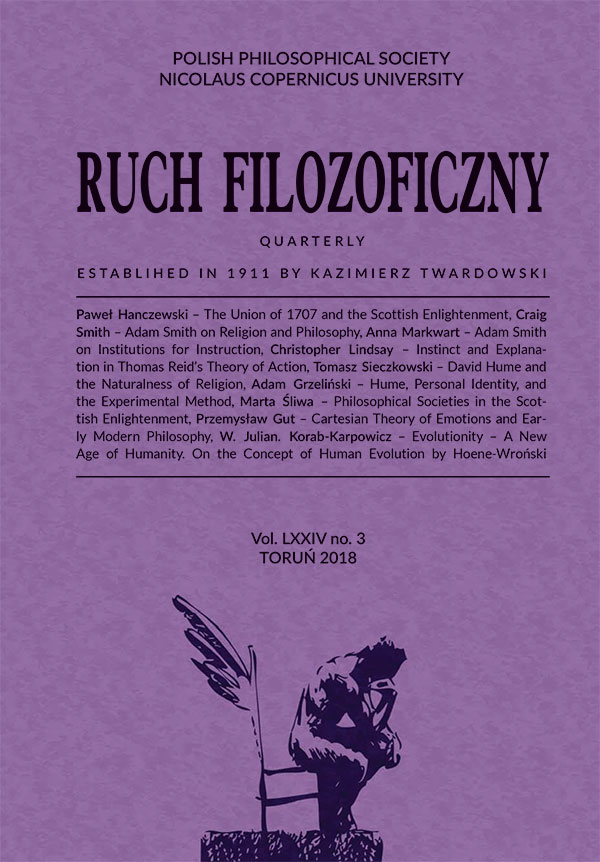The Cartesian Theory of Emotions and Early Modern Philosophy
DOI:
https://doi.org/10.12775/RF.2018.031Keywords
Descartes, emotion, passion, Spinoza, HumeAbstract
In this paper, I am going to present the Cartesian theory of emotions. The founder of modernity initiated deep changes in the way we understand emotions: their origin and effect on the human being. It is his doctrine of emotions that provided the basis for most discussions on issues concerning emotions in the 17th and 18th centuries and becamea reference point for most theories of emotion created in modern times. I attempt, in particular, to make two claims. First, I argue that Descartes’ position on the nature of the emotions is best interpreted as something between the physiological theory and the cognitive theory of emotions. Second, I argue that to understand Descartes’ account of the genesis of emotions or passions we have to take into consideration four factors: a) physiological changes, e) evaluation of the object, c) behaviour response or action readiness, d) manifestation especially in our facial expression. All those factors are part and parcel of origin of each emotion.
References
Alanen, Lilli. Descartes’s Concept of Mind. Cambridge, MA: Harvard University Press, 2003.
Cottingham, John. Descartes, Oxford: Blackwell, 1986.
Clarke, Desmond. Descartes’s Theory of Mind, Oxford: Oxford University Press, 2005.
Della Rocca, Michael. Spinoza. London and New York: Routledge, 2008.
Descartes, René. The Philosophical Writings of Descartes, translated by R. S. J. Cottingham, D. Murdoch, R. Stoothoff and A. Kenny. Cambridge: Cambridge University Press, 1985–1991, vol. 3.
Descartes, René. The Philosophical Writings of Descartes, translated by J. Cottingham, R. Stoothoff, and D. Murdoch, vols. 1 and 2. Cambridge: Cambridge University Press, 1984.
Descartes, René. Oeuvres de Descartes, edited by Charles Adam and Paul Tannery, 12 vols. Paris: Librairie Philosophique J. Vrin, 1996.
Gaukroger, Stephen. “Descartes’ Theory of the Passions.” In Descartes, edited by J[pełne] Cottingham, 211–24. Oxford: Oxford University Press, 1998.
Le Goff, Jacques. Człowiek średniowiecza. Warszawa–Gdańsk: Wydawnictwo Marabut, 1996.
Hoffman, Paul. “The Union and Interaction of Mind and Body.” In: A Companion to Descartes, edited by J.[pełne] Broughton and J[imię]. Carriero, , 390–403. Malden: Blackwell, 2008.
James, Susan. Passion and Action: The Emotions in Seventeenth-Century Philosophy. Oxford: Oxford University Press, 1997.
Knuuttila, Simo. Emotions in Ancient and Medieval Philosophy. Oxford–New York: Oxford University Press, 2004.
Lyons, William. Emotion. Cambridge: Cambridge University Press, 1980.
Rutherford, Donald (ed.). The Cambridge Companion to Early Modern Philosophy. Cambridge: Cambridge University Press, 2017.
Schmitter, Amy. “How to engineer a human being: passions and functional explanation in Descartes.” In A Companion to Descartes, edited by Janet Broughton and John Carriero, 426–44. Malden: Blackwell, 2008.
Shapiro, Lisa. “Descartes’ Passions of the Soul and the Union of Mind and Body.” Archiv für Geschichte der Philosophie 85, no. 3 (2003): 211–248.
Sorabji, Richard. Emotion and the Peace of Mind: From Stoic Agitation to Christian Temptation. Oxford: Oxford University Press, 2000.
Spinoza, Baruch. “Ethics.” In The Collected Works of Spinoza, vol. 1, edited and translated by E. Curley. Princeton: Princeton UP, 1988.
Swieżawski, Stefan. Święty Tomasz na nowo odczytany. Kraków: Znak, 1983.
Vyverberg, Henry. Human Nature, Cultural Diversity, and the French Enlightenment. Oxford–New York: Oxford University Press, 1989.
Downloads
Published
How to Cite
Issue
Section
Stats
Number of views and downloads: 1460
Number of citations: 0



